Existing User Log In
New User Registration
Register for a free account to gain full access to the VGChartz Network and join our thriving community.



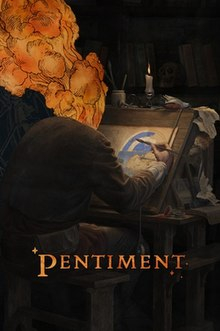

America - Front


America - Back

Obsidian Entertainment
Adventure
 (Add Date)
(Add Date) (Add Date)
(Add Date) (Add Date)
(Add Date)
| Owners: | 0 |
| Favorite: | 0 |
| Tracked: | 0 |
| Wishlist: | 0 |
| Now Playing: | 0 |
Reviewer’s Note: Given the importance of diving into the narrative for my abundant praises – and scant critiques – some SPOILERS will be present in this review. Read on at your own risk.
Pentiment/Pentimento (in art): the presence or emergence of earlier images, forms, or strokes that have been changed and painted over
When you think about the course of human history, and the narratives of varying veracity we've constructed, it can be impressive and troubling to consider how much is subject to interpretation. The original images, forms, and strokes (if you will) of this living tapestry can be erased or altered to craft an overarching tale, yet they can still potentially bleed through, telling their own story. It's fitting then that players' first interaction is using a smooth stone to scrape away finely-scribed Latin from an ancient tome. Within the pages of this book, a new historical narrative is being made for preservation. It's this woven visual & mechanical harmony that makes Pentiment one of Obsidian's most understated titles, and also one of its most thematically-rich & engaging.
History runs deep through the fictional people and land of 16th century Tassing, a hamlet nestled in the Bavarian Alps. As a journeyman artist, Andreas Maler has been contracted by the Kiersau Abbey, perched above this quaint village. His unique station provides a yearned-for flexibility to toil away on his masterpiece in the priory's scriptorium, while also regularly communing with the locals. This establishes his new role after an inciting incident: a young nobleman is gruesomely murdered on church grounds. Being the town's best option for unravelling the truth and having the drive to prove an elderly monk's obvious innocence, you're charged with gathering evidence and a list of other suspects before the archdeacon's arrival. The clock is ticking, however, and someone's head has to roll for this injustice.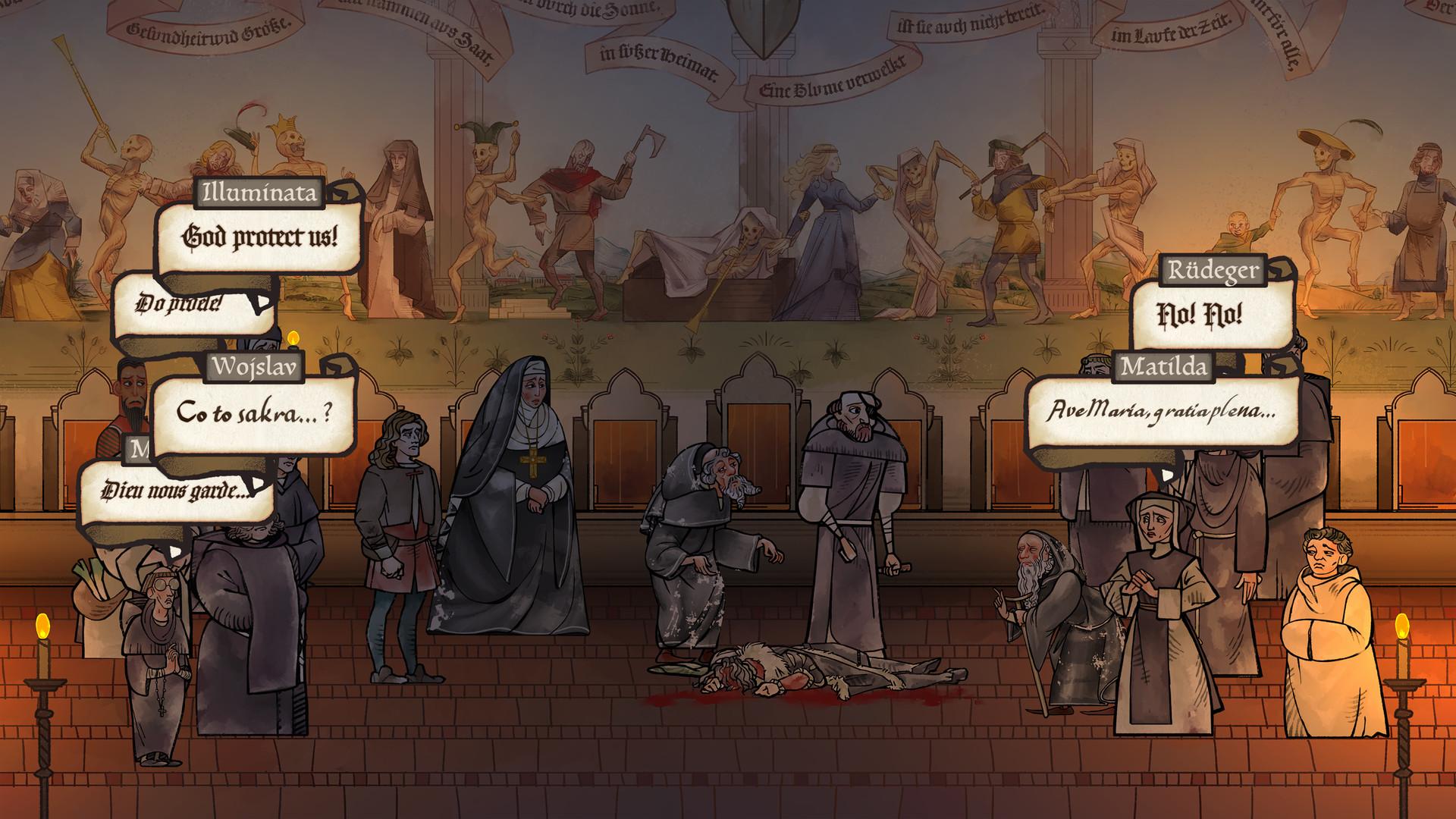
This merging of medieval slice of life and Sherlock Holmes captures a peculiar kind of balance for a 2D narrative adventure, especially for this studio. In keeping with Obsidian's wheelhouse, light RPG elements for your version of Andreas are explored within the opening minutes. Where he was educated abroad and what scholastic interests shaped him will offer new dialogue opportunities and ways of uncovering certain contextual clues. Neither the monks, nuns, nor townsfolk are as squeaky-clean as you'd suspect. The lynchpin to playing Colombo comes back to your time crunch; there’s no possible way to explore every suspect's motive, means, and so on before laying out all the evidence – all of which is circumstantial anyways.
That limitation informs your standard order of events: pursuing a particular lead typically eats up either your whole morning or afternoon, while lunch and dinner with various hosts act as respites in between, which could offer valuable gossip as well. There's always some type of activity tied with chasing leads, be it solving a volvelle with a cipher or plucking firewood in the nearby forest, and they add flavor to what's otherwise a cut above a visual novel. With the special exception of light exploration, most notably the overwrought interconnectedness of the abbey, the lion's share of everything done is reading text. It's readily apparent that this won't appeal to a mass market audience. Even after laying out these conditions, there are some quality-of-life nitpicks like the lack of fast travel (even if not to a general area) or missing clarity for some side objectives that could've gone a long way.
While there's plenty to vaunt over Director/Writer Josh Sawyer & co.'s written words, Pentiment's visual storytelling ranks as one of the best modern examples. Hannah Kennedy & co.'s art design sedulously captures the Middle Ages through its calligraphy variants, wood-print characters, painted backdrops, and… even that era's strange way of depicting horses. To rehash a trite reviewer meme: it really makes you feel like you're inside the pages of an illustrated manuscript. In emphasizing this town as being a part of history, the UI elements constantly remind you of being within a "living page," so to speak. Every transition with a loading screen has a page-turning animation, an interactive journal you flip through catalogues all pertinent information, and other special touches are used to consistently feel as though you're inhabiting an olde European legend.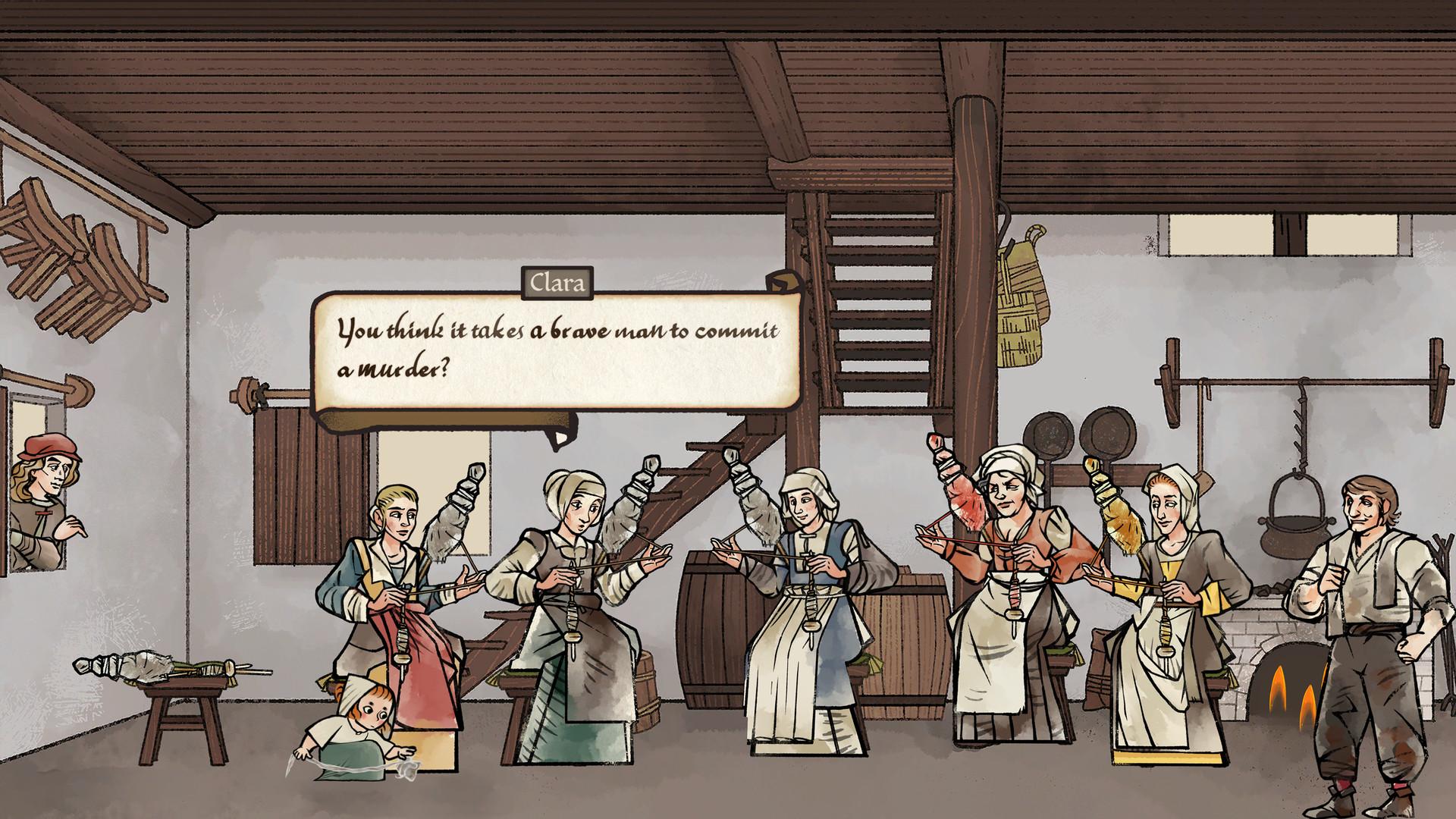
Who knew how much personality could be found without hearing a voice? Nary a spoken word is heard, aside from a few Latin hymns by the impressive Alkemie Early Music Ensemble; not even old-school text-to-speech grunting (a la the Banjo-Kazooie series) is present. Many would reflexively think it's a budgetary issue, but this application actually feels more cohesive. Instead, all text is written out and heard as though a quill is scratching parchment. That physical element in seeing words scribbled onto everyone's speech bubbles captures a special flow, especially with its visual tricks:
All these and more add a distinct personality that'd be lost by simply listening to voice acting.
Past lending it a lived-in atmosphere, these bubbles are also utilized to infer Maler's mind through his interactions with different classes. Since most – if not all – peasants can't read, their typeface is rougher and more frequently littered with spelling errors; Maler's education is denoted with cleaner lettering; nuns and monks have a more monastic & ornate script, with letter outlines that are subsequently filled in with ink; and perhaps my favorite is the local printer, whose sentences are initially upside down before being pressed into his speech bubble. Several of these fonts are not only a showy way to delineate people, but also to understand how Maler views them, which is subject to change. For example: when Andreas learns the nobleman he’s talking to has a scholarly background all of his speech bubbles then match Maler's script. Several of Pentiment's best moments stem from this effective means of communication.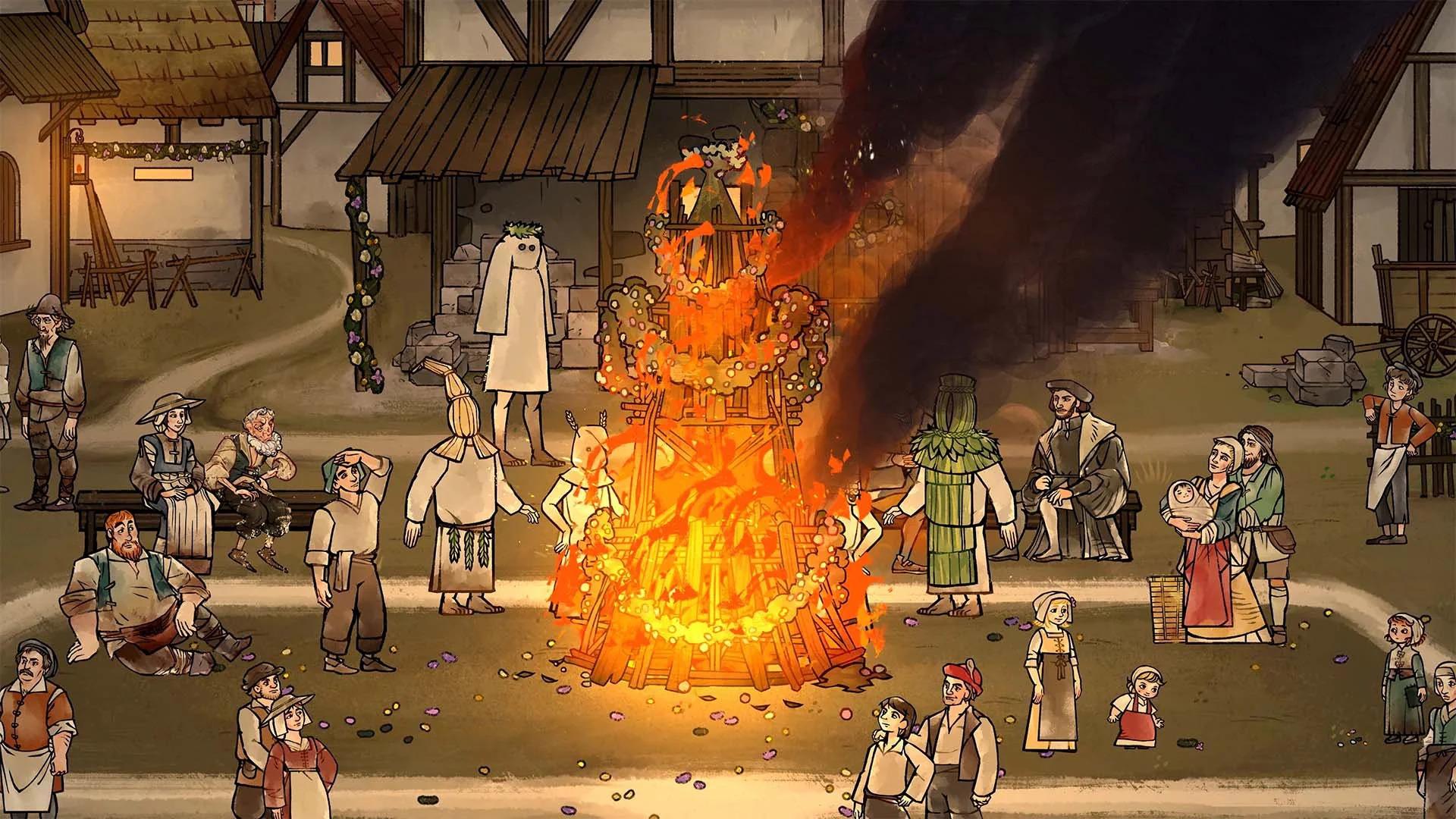
Fortunately all of these fun nuances amplify a great script. While, yes, the first fundamentals of an artist striving to create a great work of art being saddled with a murder-mystery seems disjointed at first glance, eventually the true focus arrives and these two elements congeal. Nestled within these cases to solve is a grander idea about the eras of a peoples & a place. The gap between Pentiment's three acts varies between years and decades, and nearly half of the townsfolk at the beginning don't reach the end; conversely, new arrivals that show up look to the past with a shade of mythology, which also resonates with the deeper history of pre-Christian forebears who first broke Tassing's ground. It's like those Russian nesting dolls: the cycles of change being highlighted aren't just of peoples, but of faiths, social systems, and so on and so on.
These deeper themes are succinctly expressed through a panoply of well-rounded characters and mostly-faithful dialogue as well. You don't even need to scour the credits' glossary of other fictional and historical works (including Umberto Eco’s The Name of the Rose) to know this writing crew has a passion for the political and religious history of this age; like that of The Forgotten City, its authenticity and innumerable references kept me just as ensorcelled as many of gaming's richest sci-fi or fantasy worlds. And since each of the three acts feel like a short novel in their own right, so many characters are given genuine development.
Of course, that's not to say it’s without blemish. I do have to dip into SPOILER territory for a bit (as vaguely as possible), but I’ll say one of the few things that diminishes its authentic medieval atmosphere comes from a protagonist change-up in the final act. While the majority of dialogue maintains a reasonable level of modernization, said female protagonist strains credulity when certain RPG background options and occasional "medieval Daria" rejoinders get the better of her. You're just asking the town to suspect her of witchcraft at some point. While I can sympathize with balancing that narrative tightrope of marrying present & past, it stands out like a sore thumb compared to the era-believable atmosphere seen everywhere else. I'm also not enthused by the non-commitment to who's the real killer in these cases. One could contend that such an ambiguous attitude enhances replayability for what are typically one-and-done adventures; that's impressive given Pentiment's standard runtime of ~10 hours already, but it nevertheless leaves something for players to never truly grasp. Perhaps its ambiguity captures the uncomfortable reality of determining guilt back then, even if the dialogue conveying that comes off as clunky towards the end.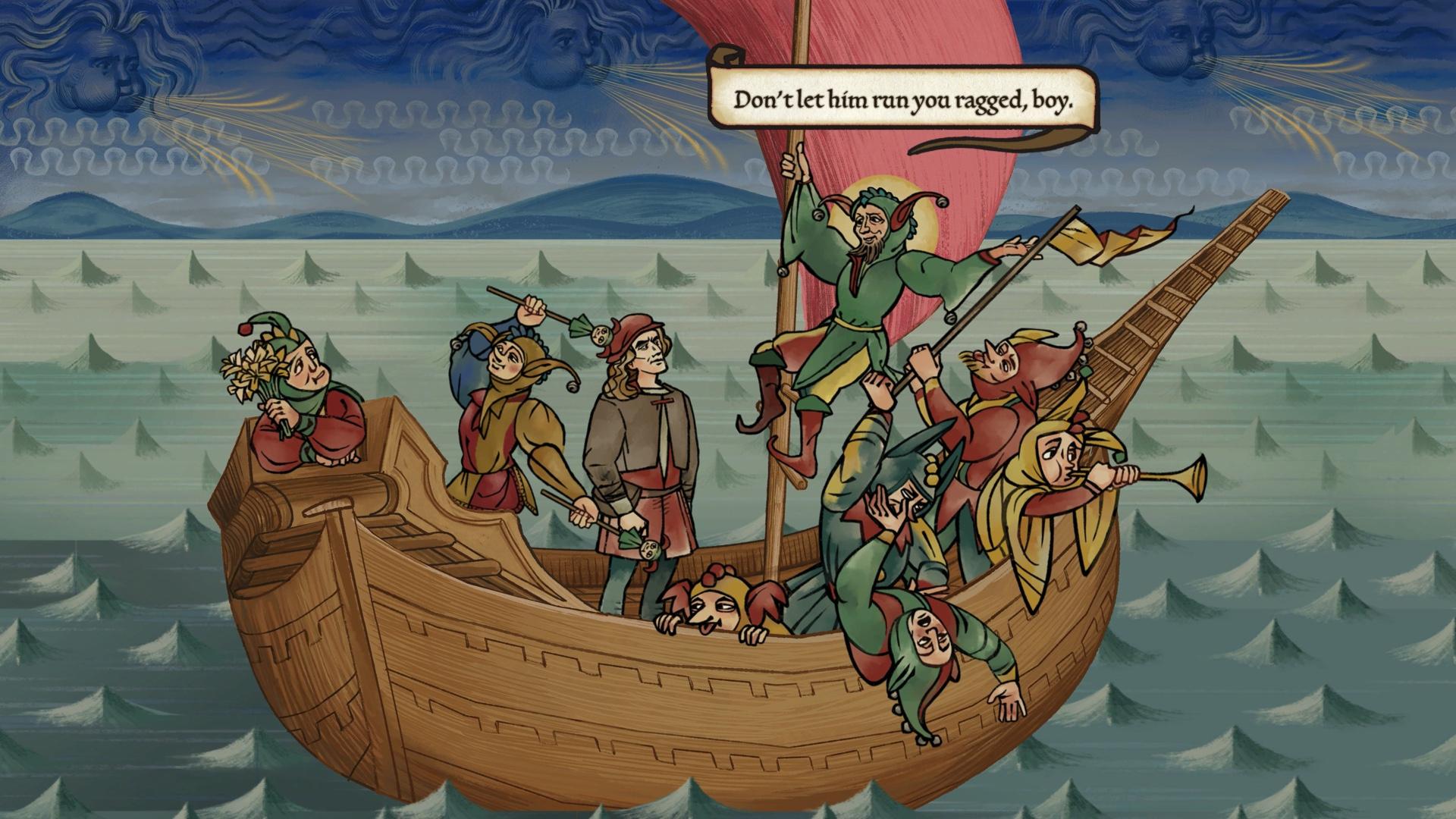
When it’s all said and done, Pentiment is one of the most impressive narrative adventures in recent years. From the words scrawled across the page to impressive background details, there's a distinct appreciation for history coming out of every pore; moreover, it doesn't merely succeed at doing its homework, but also in fashioning unique visual storytelling that harmonizes with its rich narrative & themes. There are some specific design and narrative critiques, but none of them outright smother the abundant successes. For a title so reverent of history, it feels like divine justice that Obsidian's special adventure earns such a high spot in the annals of its own.
Contractor by trade and writer by hobby, Lee's obnoxious criticisms have found a way to be featured across several gaming sites: N4G, VGChartz, Gaming Nexus, DarkStation, and TechRaptor! He started gaming in the mid-90s and has had the privilege in playing many games across a plethora of platforms. Reader warning: each click given to his articles only helps to inflate his Texas-sized ego. Proceed with caution.









